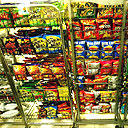
Parents should include some fat in the diets of their children despite concerns about obesity, experts said today.
Research published in the Nutrition Journal said fat should be included as part of a healthy and balanced diet because children burn more body fat than adults for each calorie used up.
An American team, led by John Kostyak from Pennsylvania State University, used a range of "calorimetry" tests for its research on 10 children (five boys, five girls) aged six to 10 and 10 adults (five men, five women), who spent most of their time watching films or reading during the testing period.
All had a body mass index within the healthy range and were given a standard diet - meals comprising 13-18% protein, 50-55% carbohydrates and 30-35% fat - for three days prior to each test, although portion sizes were adjusted according to an estimate of each person's calorie requirements.
The researchers measured metabolic rate and the amount of nitrogen in urine, using the results to calculate how much fat participants oxidised.
They found that the total amount of fat burned by children did not differ greatly to that burned by adults, but children burned considerably more fat relative to the amount of energy they used.
The authors said: "Prepubescent children may oxidise more fat relative to total energy expenditure than adults for the purpose of supporting normal growth processes such as higher rates of protein synthesis, lipid storage and bone growth.
"Sufficient fat must be included in the diet for children to support normal growth and development. Despite this, many parents and children restrict dietary fat for health reasons."
Tam Fry, board member of the National Obesity Forum and chairman of the Child Growth Foundation, said: "I think this research is absolutely right. Young children need more fat and energy for the whole purpose of growing up and living. Therefore, to give them low-fat and sugar-free products is a bad idea.
"The whole business of food is so full of mixed messages but the basic message is, if the word 'diet' is written on a packet or can, it really shouldn't be given to children who have totally different energy needs for their growth, and who burn off a lot of energy just by growing."
The foundation recommends that children should eat "straightforward wholesome food" such as vegetables, bread, fibre and carbohydrates, and warns "fad diets are not appropriate for young children".
Fat facts
· Women and girls use up fat at a higher rate than men and boys.
· The recommended daily intake of fat for a boy aged between 11 and 14 is 86g, including 27g of saturated fat.
· Girls of the same age have a daily recommended total of 72g of fat, including 23g of saturated fat.
· For children aged seven to 10, the recommended fat intake in 76.6g a day for boys, and 67.7g a day for girls.
· A typical bag of crisps has around 14g of fat, of which 3.5g is saturated.
· In the UK, one in four 11- to 15-year-olds are overweight or obese.
· A 2006 study by the Food Standards Agency found that most primary schools were not meeting all of the national nutritional standards because they were serving starchy foods cooked in oil or fat more than three times a week and not serving fruit-based desserts at least twice a week.

